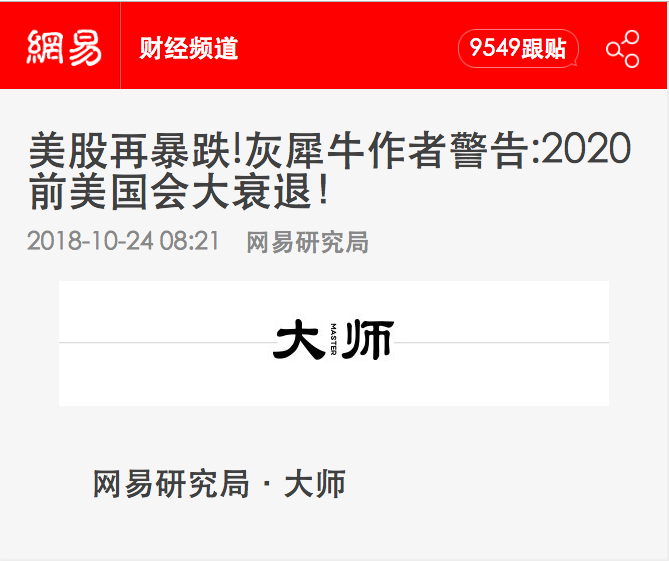The Chinese financial website Netease recently interviewed Gray Rhino & Company CEO Michele Wucker about the return of market volatility. You can read the article in Chinese, published October 24, 2018, HERE. The English version follows below
Netease: Why have US stocks plunged? What are the reasons?
Michele Wucker: The short answer is that markets have been on a “sugar high” from quantitative easing, and sugar highs inevitably end with a crash. Because the stock market is unstable, it is extremely vulnerable to shocks. There are any number of specific reasons –Turkey, Argentina, trade tensions, geopolitical uncertainty, rising interest rates, you name it – but none by itself would be enough to cause a crash were it not for underlying instability. A tiny feather or flap of a butterfly’s wing would be enough to topple such a market built on air.
Netease: Trump started a new round of bull market in the United States. Does this plunge mean the end of this round of bull market in the United States?
Wucker: Anyone who thinks the bull market will go on indefinitely is in deep denial. In fact, more and more respected analysts now agree that the end of the bull market is near. Ray Dalio of Bridgewater, for example, described it as the seventh inning of a baseball game, or getting close to the end.
Some of the “Trump bump” rise in stock prices came from temporary stimulus from the tax cut that Congress approved nearly a year ago. Companies have used their earnings for record buybacks of their shares, driving prices higher. Many also took advantage of new, lower rates to repatriate profits to the United States.
But this can’t last. Trump claimed that companies would use the tax cuts to raise wages, but that didn’t happen, and that’s bad for the economy. The lower wages are, the more likely people are to spend extra money when they get it. That boosts economic activity, which in turn helps corporate profits and grows the economy. Instead, companies just put the tax cuts back into the stock market, inflating the speculative bubble even more and failing to invest in the real economy.
And an increasing number of analysts are predicting a coming recession –though many think it’s farther out, not until 2020, than I do.
Netease: Is this US stock market plunge an accident? How long will it last?
Wucker: It’s always hard to tell exactly how long a market plunge will last, and we saw share prices bounce back after a couple days of losses. Fox News, which is close to the administration, actually urged viewers to buy stocks. I’ve heard that some brokers are urging clients not to sell after the mid-term elections –perhaps so as to help the the Republican Party- so it would not be a surprise if prices were to fall more after the elections, no matter which party does better. Some financial analysts are continuing to come up with reasons why stocks will keep going up. But there’s a lot of pressure in the financial industry to produce bullish estimates.
If the Fed eases off on its rate hikes –as it likely will if losses are more severe— investors will pour money in because they are more afraid of being outperformed on the way up, than in losing more on the way down. And the better the way you do on the way up, the bigger the bonus you get, while on the way down it’s bad no matter what. So, as they say, you dance while the music is playing.
Netease: The US Federal Reserve has raised its interest rate three times within this year, does this contribute to the main reason for this plunge? How do you view the Fed’s attitude towards interest rate? Should China raise interest rates at this time? How do you see the differences between Trump and Powell?
Wucker: The rise in US interest rates certainly contributed significantly to the plunge. But the Fed hikes are only part of the bigger story, which is that we are nearing the next phase of the economic cycle. Economic expansion can only go on for so long, and the US stock market recently hit a new record for the longest bull market ever. At the same time, Trump’s unleashing of trade wars will take a toll on global growth, while also feeding inflation. In other words, there are many dangerous economic forces at play.
It’s impossible to answer the question of whether China should raise interest rates without looking at the bigger picture of what other policies are on the table. Raising interest rates would support the RMB and would be consistent with China’s deleveraging effort and more efficient capital allocation. But there are trade and economic growth elements to the policy mix as well, and you can’t evaluate one policy without thinking about the system.
The United States has relied too heavily on interest rates to maintain the illusion of economic health, when in fact low interest rates have encouraged speculation in the securities markets instead of investment in the real economy. I think Powell understands that too low interest rates for too long encourage poor resource allocation. And, though he has talked about the economy as almost “too good to be true” and spoken positively about prospects, I think he also is aware of the danger of overheating and creating an even bigger bubble. Trump’s pressure on Powell also may backfire, as the idea of central bank independence is important to inflation hawks and sound money advocates, with good reason.
Netease: How do you view the sharp rise of US Treasury bond yields? How long will this last? What is the impact on the stock market?
Wucker: Rising US Treasury bond yields reflect rising worries about inflation and a slowing economy, combined with a rising risk premium. However, we will see more volatility in bond markets because of the tension between opposing forces: prices usually fall as interest rates rise, but at the same time people are searching for relatively safety amid a coming storm. A rising dollar and tightening Fed policy will support Treasury prices, even as we will see increasing distress in corporate debt, particularly lower credit quality.
The bond markets also will depend on attitudes toward the dollar, which has long benefited from its role as a global reserve currency, and so tends to strengthen during financial storms –especially when US rates are rising compared to other countries. But when the United States itself is the source of political and economic uncertainty, and the current occupant of the White House is someone whose career has been marked by bankruptcies and has even suggested the United States might not honor its obligations, the role of the dollar and US Treasurys as “safe” is no longer certain. The only other relatively “safe haven” is gold.
Netease: Why have technology stocks experienced plunges in the US stock market? Does it mean the end of the Internet stock bull market?
Wucker: Technology stocks make up a huge part of the stock market, so it’s natural that an overall drop will hurt the technology sector. But tech companies also have benefitted from super low interest rates which have given them the freedom to invest in innovation and experiments, so rising rates will hurt them in this sense.
However, US technology companies also have inflicted wounds on themselves through careless mistakes: Facebook’s ongoing troubles over its misuse of private data, and more recently Google’s failure to disclose a security breach on its Google Plus platform. And many new tech companies have been burning through investments irresponsibly simply because money is so cheap.
It’s important to note, however, that tech companies have been using low rates to develop new products and services with potential to create jobs and economic growth –that’s a far more productive use than simple financial speculation, which is how too many people have used quantitative easing.
Netease: The US stock market crash was also transmitted to other major capital markets in the world. The Chinese A-share market hit a four-year low.How should China’s capital market respond to the transmission effect brought by the US stock market crash?
Wucker: There’s no one answer, since a capital market reflects the interaction of many different decisions and priorities. And the purpose of markets is to work out how collectively its participants respond. It’s very important, however, for capital markets to have a healthy policy environment that supports optimal use of resources.
That is not the case in the United States. Our tax system favors financial speculation over investment in the real economy –for example, last year’s tax reform did not eliminate a deduction for margin interest on borrowed securities, and low capital gains taxes encourage investment in financial markets rather than the real economy.
Because markets have been largely gaining for nearly a decade, it’s worth a reminder that what goes up eventually goes down; that some amount of correction is healthy, even when it is not particularly pleasant.
It’s worth remembering that without the real economy generating value, stock market booms are merely fictions –and the world has paid too much attention to stock markets as indicators of economic health rather than where they should be looking.
Netease: The Fed’s interest rate hike and the US stock market crash have had a significant impact on the Chinese market. Will this cause systemic risks in the Chinese economy? Will there be a “black swan” incident in the Chinese economy?
Wucker: By definition, you can only see black swans when looking backward; the concept is useful in reminding us that surprises can happen, but while the exact nature of a surprise is unknown, it is certain that we will get a surprise.
That’s why it’s so important to pay attention to gray rhinos, which you can see and do something about. Many black swans happen because we ignore gray rhinos; and the more we ignore the gray rhinos, the more dangerous the black swans become when they do appear.
That’s why it is good that China started paying attention to financial risk long before the United States did, though of course there is still much work to do. China’s gradualist approach to change is far better than the United States approach, which is to let problems grow until a major crisis explodes. I fear that not enough people with the power to shape US financial policy are paying attention –though more and more observers are sounding the alarm.
In this case, US political instability and misguided economic policies are the gray rhino charging at China and the global economy.
Like every country, China has its own systemic risks. Unfortunately United States policy has interfered with China’s efforts to reduce financial risk, but that’s not a reason to stop reforming. China is limited in what it can do to affect US policy, but it has considerably more power in how it responds.
Netease: Recently, both developed and emerging markets have experienced big crashes in capital markets. Is it possible for the world economy to fall into a new round of economic crisis? Will the United States usher in another “Great Recession”?
Wucker: Absolutely a new round of economic crisis is possible –not only possible, but likely. That is obvious to anyone who has studied financial history and knows that “this time is NOT different.” Busts come after booms, and after a boom as big as the one we’ve seen over the past decade, the bust will be big too.
- Conversation with Peter Atwater of THE CONFIDENCE MAP - November 2, 2023
- In Conversation with Hao Hong - October 17, 2023
- Thinking Strategically at Risk Awareness Week 2023 - September 13, 2023


